TRIENNIAL REPORT 2022-24
LAND RIGHTS AND RESILIENCE
stories from our network
A MESSAGE FROM THE CO-CHAIRS

Doris Munyingi
GROOTS Kenya, co-Chair
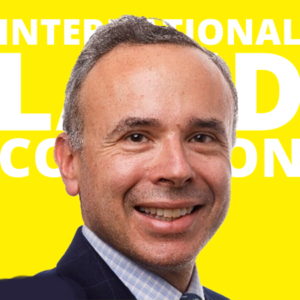
Juan Carlos Mendoza
IFAD, co-Chair
We are thrilled to present the International Land Coalition’s 2022-2024 Triennial Report – which is both a testament and a promise to the nearly 84 million people represented by our members worldwide.
Two years ago, we pledged to shift power to people’s organisations, and we’re seeing meaningful changes t. An independent review by Keystone confirmed that only 10% of members now see ILC as a centralised organisation, showing real progress towards a more inclusive governance model.
Today, we take pride in the fact that our Council has brought together a powerful representation of Indigenous Peoples, pastoralists, women, youth, and smallholder farmers’ organisations. This diversity makes us stronger. For ILC, it is fundamental that the people who live on and from the land are able to lead and have a strong voice in our decisions together with other constituencies represented in our network .
That is why it is no small feat that 39% of our council seats are held by people’s organisations — a major milestone for our Coalition. At the national level, people’s organisations now lead 23 out of 32 National Land Coalitions, a notable 19% increase since 2023, and a strong indicator of our commitment to grassroots-driven change.
This shift isn’t only about ILC Governance and operations – it is reshaping all our work, including how we build partnerships, share knowledge and learn from each other, and make our plans with inputs from diverse constituencies. We’re committed to making all their voices heard in local and global policy discussions through compelling storytelling and data that holds governments and corporations accountable.
All this helps us achieve impact where it really counts: with support from ILC members, 2.6 million people indirectly, and 148 thousand people directly, have gained secured land rights over the last three years.
As you read this report, we hope you’ll see the difference this power shift is making across the network. We are grateful to serve ILC’s members on this journey toward a fairer, more inclusive world.
On behalf of the ILC Council, we look forward to continuing working together!
MEET ILC’S LEADERSHIP
As part of ILC’s power shift, groups representing each of the five priority constituencies are working to build and amplify a common voice for their communities worldwide. They also guide action by ILC to address the particular land rights challenges their constituency faces. These are the faces and voices of some of the community members leading the charge and what they have to say about the network’s evolution! While reading the report, keep an eye out for stories from these constituencies by identifying their unique icon.
Red de Jóvenes Indígenas de Latino America y el Caribe, Bolivia
The women’s constituency is important because it is an integral part of gender equality. It helps women to raise their voices and decision-making process in the patriarchal society. And constituency can break all the gender-based stereotypes and barriers.
Small scale family farmers contribute at least 35% of the world’s food, and as much as 80% of the food in the Asia and Africa regions, even if they are covering only 12% of global agriicultural lands. Yet, they still do not have a significant say in policies that affect their livelihoods. Thus, our sector remain very vulnerable to the multiple crises on climate, prices, conflicts. We commend the ILC leadership for its shift to power, providing our organizations significant seats, spaces and platforms in its governance processes and operations. This will help build our capacities on leadership, networking, and policy engagement, promoting further our ambiition of ensuring rights of women, men and young family farmers to land and water resources, and to sustainable land use management.
Estrella “Esther” Penunia
Secretary General, Asian Farmers’ Association (AFA)
FOREWORD
We hardly need to be reminded that we are living in unprecedented times. Yet year upon year, our members face political and social persecution combined with tremendous pressures on their land that make it more difficult to protect, nurture, and live from it. Change can be a very long and difficult road, and the challenges we face are complex and deeply entrenched.
We came into this triennium already knowing that land inequality is growing in most countries, and faster than expected. We now face an existential threat that is deepening this inequality. Pressures on land provoked by the climate crisis are creating both actual and metaphorical firestorms, torching the structures that underpin civic unity. Such pressures further erode sustainable and locally-led food systems, undermining food security and livelihoods, and provoking dispossession at an alarming scale.
These crises call for a reset. With the power of our network behind us, we’re taking on the challenge for system change.
In this report, you will read inspiring examples from our members. You will meet people who are healing our ecosystems with their hands and using their deep knowledge to nurture soils and sustain the world’s remaining agrobiodiversity, shaping the food systems of tomorrow.
You will read stories on how we’re sharpening our defenses against repression and attacks that members of our network face by leveraging people’s data to demand accountability, shedding light on what otherwise may be unseen. By creating space and amplifying our members’ voices, we are able together to create alternative policies and politics, from local to global levels.
These stories – our collective achievements – form the bedrock of an equitable future – a tomorrow in which local communities have the tools they need to uphold democracy and defend themselves against authoritarianism, despotism, ecosystem destruction, and other forms of historically-entrenched oppression.
We know that the path to change can be difficult, and we do not always get everything right. Yet as we close 2022-2024 and embark on the next triennium, we are energised by how far we’ve come – a great deal thanks to our diversity, unity, and reach. Together, we stand firm in the knowledge that the road out of inequality, broken food systems, declining democracy, and the climate and nature crises must be built on land rights for the people who live on and from the land. This is the foundation of the just and resilient future we will continue building together.
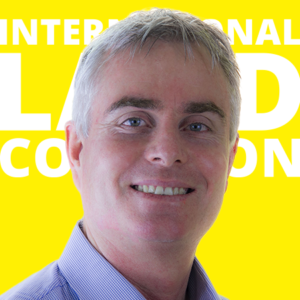
Mike Taylor
ILC, Director
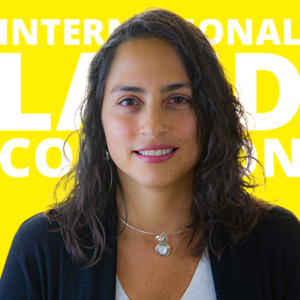
Zulema Burneo
Coordinator, Latin America
& the Caribbean
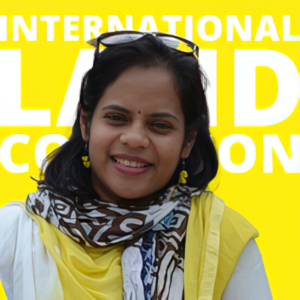
Anu Verma
Coordinator, Asia
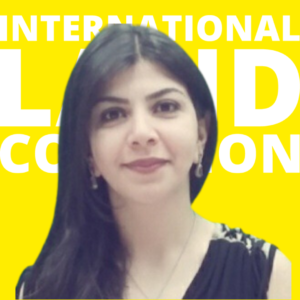
Shahd Almukhtar
Coordinator, Europe, Middle East & North Africa
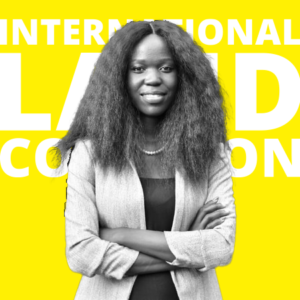
Eva Okoth
Standing Coordinator, Africa
As a long-standing supporter of the ILC, we have been impressed by the strength of the network and the quality of its impact, in large part due to the commitment and dedication of ILC and its members. Especially coordinated efforts over the last three years on land data, support to land defenders and the ILC governance reform, giving more power to people’s organisations.
ILC helps inform EU strategies and actions worldwide, highlighting how equitable land governance is key to achieving global objectives on human rights, food security, climate change, and biodiversity.
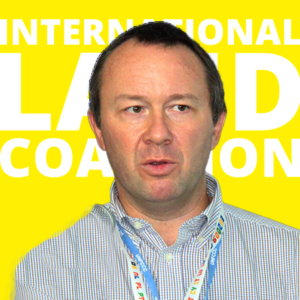
Etienne COYETTE
EU, International Partnerships
OUR 2022-24 IMPACT
STRATEGIC OBJECTIVE 1 (SO1)
NATIONAL LAND COALITIONS ADVANCE PEOPLE-CENTRED LAND GOVERNANCE
Number of HA secured
policies changed
- Africa: 15 Policies
- Asia: 18 Policies
- EMENA: 5 Policies
- LAC: 14 Policies
Practices changed
- Africa: 28 Practises
- Asia: 26 Practises
- EMENA: 5 Practises
- LAC: 15 Practises
Number of women involved in ILC platforms
Number of youth involved in ILC platforms
STRATEGIC OBJECTIVE 2 (SO2)
PEOPLE’S DATA IS PRODUCED AND USED TO HOLD GOVERNMENTS AND CORPORATIONS ACCOUNTABLE
STRATEGIC OBJECTIVE 3 (SO3)
REGIONAL AND GLOBAL ADVOCACY BUILDS POLITICAL COMMITMENT TO PEOPLE-CENTRED LAND GOVERNANCE
by ILC members actions
by ILC members actions
in international spaces
in international spaces
in international spaces
